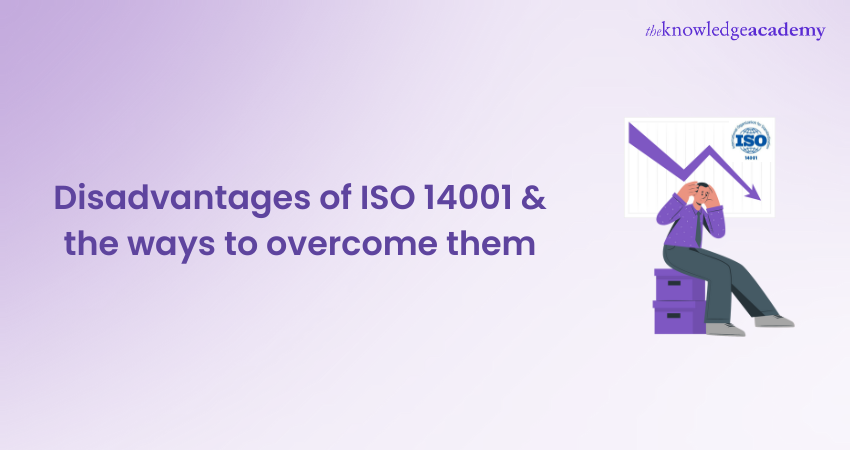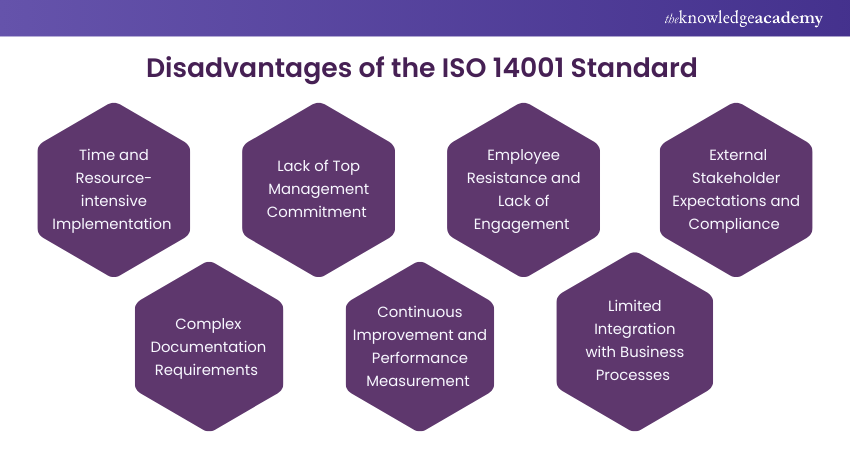We may not have the course you’re looking for. If you enquire or give us a call on +08000201623 and speak to our training experts, we may still be able to help with your training requirements.
Training Outcomes Within Your Budget!
We ensure quality, budget-alignment, and timely delivery by our expert instructors.

The ISO 14001 standard, developed by the International Organization for Standardization, is a widely recognised framework for Environmental Management Systems (EMS). It provides a framework for organisations to establish and maintain an effective Environmental Management System. While the framework has several benefits, there are some Disadvantages of ISO 14001 that organisations must address proactively considering the ISO 14001 Context of the organisation.
According to the ISO Survey of Management Systems (2022), over 420,000 ISO 14001 certificates were awarded to more than 600,000 organisations, validating their consistent compliance with ISO standards. While this statistic acknowledges the several benefits of the ISO 14001 standard, organisations may face some challenges while implementing it.
Read this blog to explore the Disadvantages of ISO 14001 and the practical solutions to overcome them. This will help you ensure the successful implementation of ISO 14001 in your organisation.
Table of Contents
1) The Disadvantages of the ISO 14001 Standard
a) Time and Resource-intensive Implementation
b) Complex Documentation Requirements
c) Lack of Top Management Commitment
d) Continuous Improvement and Performance Measurement
e) Employee Resistance and Lack of Engagement
f) Limited Integration with Business Processes
g) External Stakeholder Expectations and Compliance
2) Conclusion
The Disadvantages of the ISO 14001 Standard
Implementing ISO 14001 can greatly benefit organisations by enhancing their environmental performance. This standard provides a structured approach to managing environmental responsibilities. However, like any management system, ISO 14001 has its own set of challenges and potential drawbacks.
Therefore, it is essential to understand these disadvantages to effectively address them and maximise the benefits of implementing this international standard. Here, we have discussed the key Disadvantages of ISO 14001 and the corresponding ways to overcome them:

1) Time and Resource-intensive Implementation
Implementing ISO 14001 in your company can be a time-consuming and resource-intensive process. Organisations may need to invest plenty of effort in developing documentation, conducting audits, and training employees. This can strain the resources of small or resource-limited businesses, leading to delays and increased costs. Utilising ISO 14001 Software can streamline processes and reduce resource burdens.
Solution: Organisations can overcome this challenge by outsourcing certain tasks to external consultants or seeking assistance from experienced professionals. They can also allocate dedicated resources and provide adequate training to employees involved in the implementation process. Proper planning and realistic timelines can help streamline the implementation process and minimise disruptions to day-to-day operations.
2) Complex Documentation Requirements
ISO 14001 requires in-detail documentation, including environmental policy, procedures, objectives, and records. Developing and managing these documents can be overwhelming, especially for organisations without prior experience in implementing management systems.
Solution: Organisations can simplify the documentation process by using technology. Electronic document management systems and ISO 14001 Software tools can help streamline document revision and control. Establishing clear document control procedures and providing training on their use can also enhance efficiency and ensure compliance with ISO 14001 requirements.
3) Lack of Top Management Commitment
Strong commitment and backing from top management are essential for the effectiveness of ISO 14001. If senior leaders do not actively participate, employees may not see the EMS as important, resulting in ineffective implementation and minimal environmental progress.
Solution: To tackle this issue, companies need to make sure that their senior management is aware of the advantages of ISO 14001 and how it supports the company's sustainability objectives. Showing how EMS positively affects cost savings, regulatory compliance, and brand reputation can help gain support from leaders.
Regularly communicating, holding management review meetings, and integrating environmental goals into key performance indicators can additionally strengthen top management's dedication.
4) Continuous Improvement and Performance Measurement
ISO 14001 highlights the need for continuous improvement in environmental performance. However, organisations may struggle to establish effective performance metrics, track progress, and identify improvement areas.
Solution: Organisations can overcome this challenge by defining clear and measurable environmental objectives and targets aligned with their business strategy. Implementing Key Performance Indicators (KPIs) and tracking progress regularly can provide insights into performance trends and areas requiring attention. Conducting periodic environmental ISO 14001 Audits and involving employees in identifying improvement opportunities can also facilitate continuous improvement.
Advance your career with our ISO 14001 Course and master essential environmental management skills!
5) Employee Resistance and Lack of Engagement
One common challenge in implementing ISO 14001 is resistance from employees who may perceive it as an additional burden or unnecessary paperwork. Lack of engagement can hinder the successful adoption and implementation of the Environmental Management System.
Solution: To address this challenge, organisations should focus on creating a culture of environmental awareness and engagement. This can be easily achieved through Effective Communication and employee training programs.
Engage employees by explaining the benefits of ISO 14001, involving them in the development of environmental objectives, and providing regular feedback on their contributions. Recognising and rewarding employee efforts towards environmental improvement can also boost engagement and motivation.
6) Limited Integration with Business Processes
Another issue that companies deal with is the lack of full integration between ISO 14001 and their current business practices. The Environmental Management System might not get the required attention and backing if it is perceived as distinct from the main operations.
Solution: In order to address this challenge, businesses need to work towards incorporating ISO 14001 into their broader business strategy. Find chances to synchronize environmental goals with the company's mission, vision, and values.
Make sure to integrate environmental factors into important Decision-Making Processes and include them in the company's risk management framework. Through incorporating the EMS into everyday practices and choices, businesses can encourage a comprehensive view on sustainability and guarantee its lasting prosperity.
7) External Stakeholder Expectations and Compliance
Organisations may face challenges in meeting the expectations of external stakeholders and complying with ever-evolving environmental regulations. Failure to address concerns like these can result in reputational damage and legal implications.
Solution: To tackle this challenge, organisations should proactively engage with external stakeholders, such as regulatory authorities, local communities, and customers. Stay updated on relevant environmental regulations and ensure Compliance through regular monitoring and internal audits. Collaborate with stakeholders to understand their expectations and address their concerns.
Establishing partnerships with suppliers and relevant Stakeholders can help meet shared sustainability goals. Organisations can build trust, enhance their reputation, and mitigate potential risks by actively engaging with external stakeholders following ISO 14001 principles that address both risks and opportunities in environmental management.
Lead your organisation towards sustainable practices with our ISO 14001 Internal Auditor Training – Register today!
Conclusion
Organisations can overcome the disadvantages of ISO 14001 by adopting practical solutions discussed in this blog. They can streamline the implementation process and reduce their operations' burden by allocating resources, leveraging technology, and seeking external assistance when needed. Furthermore, integrating the Environmental Management System with business processes and proactive engagement with external stakeholders also contribute to long-term success.
Implement ISO principles to acquire environmentally friendly organisational standards by signing up for ISO 14001 Certification now!
Frequently Asked Questions

ISO provides standardised frameworks, such as ISO 9001, that help companies implement quality management systems. These frameworks enhance process consistency, identify inefficiencies, and promote continuous improvement. By following ISO standards, companies can increase customer satisfaction and drive operational excellence.

Achieving ISO 14001 certification typically takes a few months to over a year, depending on the organisation’s size, complexity, and current environmental practices. The process includes gap analysis, implementing changes, conducting internal audits, and a certification audit by an accredited body.

The Knowledge Academy takes global learning to new heights, offering over 30,000 online courses across 490+ locations in 220 countries. This expansive reach ensures accessibility and convenience for learners worldwide.
Alongside our diverse Online Course Catalogue, encompassing 17 major categories, we go the extra mile by providing a plethora of free educational Online Resources like News updates, Blogs, videos, webinars, and interview questions. Tailoring learning experiences further, professionals can maximise value with customisable Course Bundles of TKA.

The Knowledge Academy’s Knowledge Pass, a prepaid voucher, adds another layer of flexibility, allowing course bookings over a 12-month period. Join us on a journey where education knows no bounds.

The Knowledge Academy offers various ISO 14001 Certification Courses, including ISO 14001 Foundation Certification Training, ISO 14001 Lead Auditor Course, and ISO 14001 Internal Auditor Training. These courses cater to different skill levels, providing comprehensive insights into ISO methodologies.
Our ISO and Compliance Blogs cover a range of topics related to ISO, offering valuable resources, best practices, and industry insights. Whether you are a beginner or looking to advance your ISO and Compliance skills, The Knowledge Academy's diverse courses and informative blogs have you covered.
Upcoming Health & Safety Resources Batches & Dates
Date
 ISO 14001 Foundation Certification
ISO 14001 Foundation Certification
Mon 13th Jan 2025
Mon 17th Feb 2025
Mon 21st Apr 2025
Mon 23rd Jun 2025
Mon 18th Aug 2025
Mon 20th Oct 2025
Mon 15th Dec 2025







 Top Rated Course
Top Rated Course



 If you wish to make any changes to your course, please
If you wish to make any changes to your course, please


